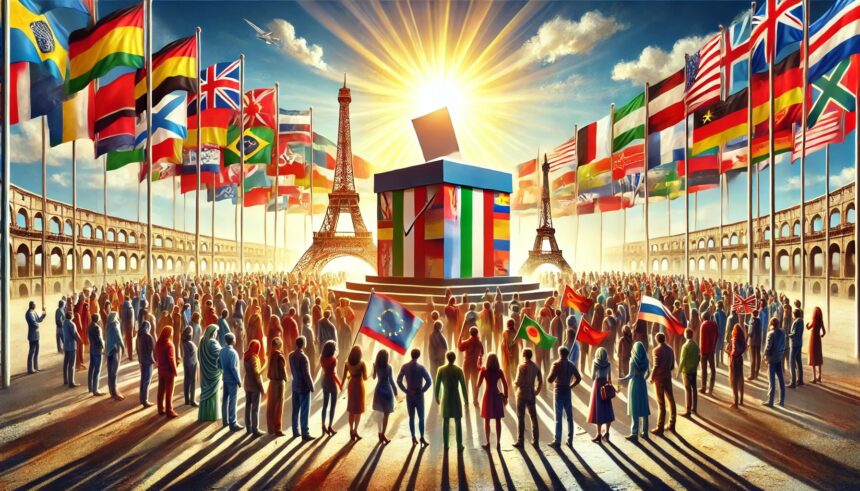The second round of the French elections, which will take place on July 7, offers an interesting lesson about democracy. In each constituency where no candidate received more than 50% of the votes in the first round, a candidate who received at least 12.5% of the votes can run in the second round. Parties or coalitions whose candidates received third place or lower may have an interest (and an informal obligation under the electoral agreement) in pressuring their candidates to drop out, to avoid splitting the vote between two candidates, in case the election of either of the two main candidates would harm their position in the National Assembly after the election. The “centre” parties aligned with the left-wing New Popular Front to try to thwart the “far-right” National Rally. (I put a question mark over the term “far-right” because the NR is not obviously more right-leaning than the NPF, and many of their nationalist proposals are similar.) This strategy resulted in the dropout of 224 candidates in 577 constituencies. (See “French elections: 224 candidates formally withdraw from second round“, Le Monde(July 2, 2024)
The purpose of the second round of voting is to increase (or guarantee, depending on the exact setting) the chances that the winning candidate can claim to represent the “will of the people,” i.e., 50%+1 of the individuals that make up “the people.” One might think that for worshippers of democracy, it would be sinful to remove one option from the voters’ menu. Technically, that would be “Neutral” Because democratic theory prioritizes some options over others, but in reality, there will always be some way of restricting the options presented to voters, simply because there are an infinite number of collective (political) options: each voter potentially has his own unique ideal choice.
For an individual voter, the restriction of voting options is not important, because his vote is not decisive, whatever the menu may be: he (and of course she) does not go to the polls, and the winner remains the same. But the political strategy of dropping one candidate may change the resulting collective choice of the election compared to what it would have been otherwise. The myth of democracy is full of contradictions and inconsistencies.
No democratic means can better express the “will of the people” than an election or a referendum. It doesn’t exist in the first placeAs I mentioned in my last post, democratic voting methods can make a big difference in the outcome.Millions of election results from one profile“, Social Choice and WelfareIn 1992, Gordon Tullock wrote: Government Failure: A Primer on Public Choice2002):
There are many different voting rules in use around the world, each of which produces slightly different results, and Saari has produced a rigorous mathematical proof that for a given population of voters whose preferences do not change, at least one voting method can produce any outcome.
All of this Condorcet’s Paradox In the modern development of democracy and in modern societies, it would be a mistake to look for a majority that cannot be found. The majority is just one of many, determined by voting systems, backroom politics, and the frequent influence of bureaucracies on the political agenda. As political scientist William Riker puts it, democratic decisions are either autocratic or “at least sometimes arbitrary nonsense” (see his book The Modern Development of Democracy). Liberalism vs. Populism1982).
A not inconsiderable advantage of constitutional democracy (“constitutional” meaning “limited”) is that it provides voters with a low-cost means of removing their rulers if a sufficient number of them become dissatisfied with them. Riker writes that liberal democracy (which means constitutional democracy in the classical sense) allows for “an intermittent, sometimes random, popular veto” and has some ability to curb “official tyranny.” We should not ask too much of democracy.
Just as the choices presented to voters are inevitably limited, group choices will always limit individual choices. It is not the only state of the world imaginable.In general, it is either inefficient or immoral, or both. Collective choice eliminates many options from an individual’s opportunity set. It directly affects the choice of every individual who would have done something that is now forbidden. This is the important issue, not a democratic myth or prop.
********************************
I told ChatGPT to “generate an image that represents democracy.” I told “him” nothing else. He described his image (the main image of this post, reproduced below) as follows: “A vibrant and diverse group of people stand together in a large open space, each holding a different flag representing a different country around the world. In the center, a large, decorated ballot box symbolizing democracy sits on a raised platform. A bright sun shines above the scene, casting a ray of hope and unity on the crowd. The background includes iconic world landmarks that represent international unity and cooperation, including the Eiffel Tower, the Statue of Liberty, and the Great Wall of China.” This is an empty concept of democracy. Democracy is a nice and good thing, but it’s probably widely shared, as the bot’s database attests. (“He” generated a second image with the same level of emptiness.)

DALL-E believes that democracy is wonderful, good and empty.







